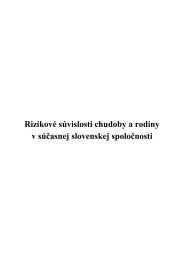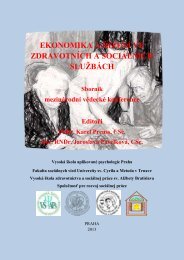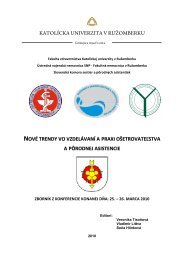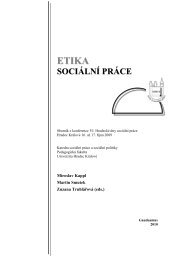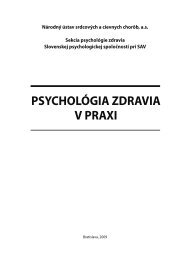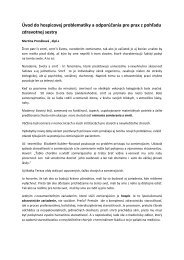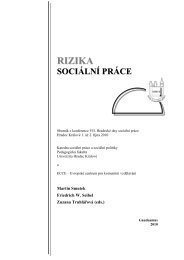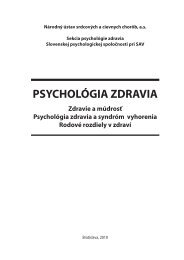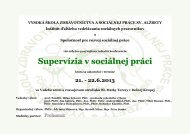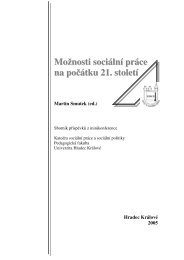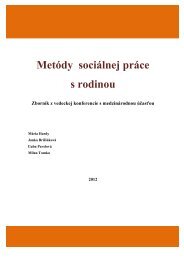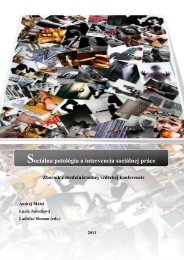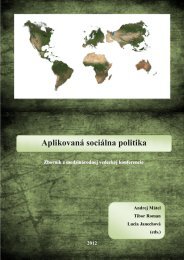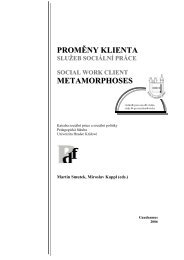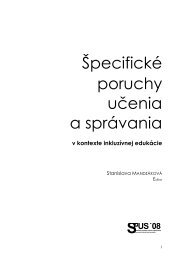Zmena klÃmy â možný dopad (nielen) na obyvateľstvo - Prohuman
Zmena klÃmy â možný dopad (nielen) na obyvateľstvo - Prohuman
Zmena klÃmy â možný dopad (nielen) na obyvateľstvo - Prohuman
You also want an ePaper? Increase the reach of your titles
YUMPU automatically turns print PDFs into web optimized ePapers that Google loves.
countries as aspiratio<strong>na</strong>l. It does not encourage critical engagement with the<br />
concept of fairess, the causes of poverty or the domi<strong>na</strong>nt model of development.<br />
It diminishes difference rather than encouraging openness to and appreciation<br />
of it. This comparison between shopping with bags and cars and shopping with<br />
baskets raises many complex global justice issues, particularly regarding the environment<br />
(infrastructural development, carbon emissions, waste, community/<br />
urban development to <strong>na</strong>me but a few). Automatically labelling the “lack” of<br />
cars as unfair prevents more open exploration of alter<strong>na</strong>tive lifestyles, critical<br />
engagement with development and reinforces the bi<strong>na</strong>ries of them and us, rich<br />
and poor. These findings raise the question of how to explore global inequality<br />
and lack of resources without perpetuating particular domi<strong>na</strong>nt theories of development.<br />
• Using Existing Development or Intercultural Resources<br />
Several of the participant educators drew on two existing educatio<strong>na</strong>l resources:<br />
an early childhood intercultural education pack and an early childhood pack<br />
looking at water in developing world contexts. With regard to use of the water<br />
pack, here participants approached the storybook with an environmental focus<br />
and bridged learning from the storybook with learning using the water resource.<br />
Several of the participant educators described using a picture of a jerrycan and<br />
discussing the experience of having to carry water a long distance.<br />
In the focus groups a few of the participants suggested drawing on development<br />
education activities designed for older children, particularly those related to<br />
trade and fairtrade. This discussion raised the problematic concept of developing<br />
early childhood learning experiences by “simplifying” activities designed for older<br />
children and highlights the need to establish a rubric for exploring global justice<br />
issues through early childhood pedagogy.<br />
• Further Work on Kenya and Africa<br />
Most of the participant educators included some acitivities looking at the location<br />
of, or further information on, Kenya. Two of the participants asked their children<br />
to make passports and e<strong>na</strong>ct a plane journey to Kenya. Several of the participants<br />
located Ireland and Kenya on maps. Others looked at Kenya’s wildlife and<br />
aspect of Kenyan culture, including foods and games. These activities support<br />
interest and engagement with Kenya; however, it is questio<strong>na</strong>ble how much they<br />
build competency in the area of global citizenship. The focus on culture and geographical<br />
landscape remains in safe territory as against the introduction of more<br />
justice-related concerns (Davies et al., 1999). While the emphasis on differences,<br />
174



